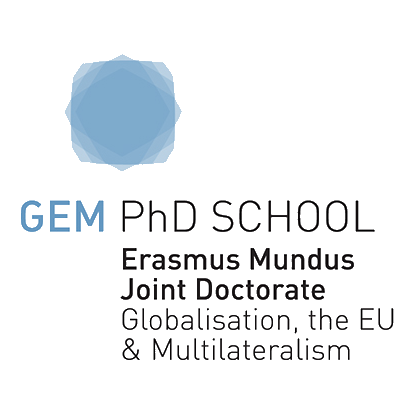GEM PhD School
Funded by the European Commission’s Erasmus Mundus Joint Doctorate Programme (FPA 2010-0010), GEM PhD School covered a variety of fields all of which offer a specific set of epistemological and methodological insights into the questions associated with Globalisation, Europe and Multilateralism.
The uniting factor behind the programme’s diverse agenda was a shared interest in: (1) the international dimension of contemporary governance challenges; (2) the lessons to be drawn from comparative research; and (3) broader insights born from the specific institutional experience of the EU’s external action. The research accomplished by any of the Academics, Researchers and PhD Fellows associated with the GEM PhD School was associted with or several of these research interests.
The programme’s perspective was resolutely international, however it included both Global Studies as well as Comparative Research. Objects of study included Global Governance initiatives, specfic EU external Actions or other regional cooperation efforts. Overall, if the European continent and in particular the EU’s experience were a central benchmark, even touchstone, of the programme’s investigations into contemporary Globalisation and Multilateralism; alternative experiences be they at the global or other regional levels were also included with a view on feeding both comparative research and a better understanding of the EU’s international environment.
GEM PhD School Final Summary Report (PDF)
GEM PhD School and GEM-STONES
Leveraging the achievements in international cooperation and transnational institution-building within GEM PhD School saw the GEM-STONES consortium willing and able to provide the highest standards of training that is widely recognized at both the national and international levels. As such, many of the training activites linked to GEM-STONES have been embedded with pre-existing GEM structures, thus benefiting from the transnational training platforms and expertise fostered among the GEM consortium partner institutions.
GEM fellows and alumni have been associated with GEM-STONES activities through: (1) submitted applications as third party participants foreseen in the “open window” chapters of some of the semi-public training activities; (2) in a few cases, as trainers for some training sessions focussed on sharing relevant experiences; (3) in some cases, as contributors to one of the 4 scheduled edited volumes built around the 15 GEM-STONES fellows; and (4) as participants in some of the student-projects set up by coalitions of GEM-STONES fellows.
![]()
This project receives funding from the European Union's Horizon 2020 research and innovation programme under the Marie Sklodowska-Curie Grant Agreement No 722826.

















